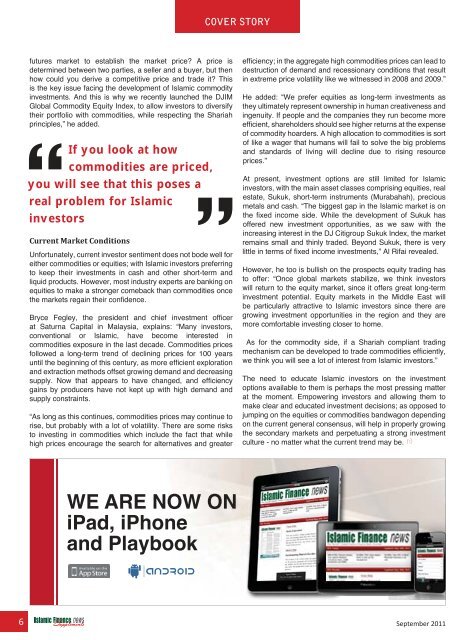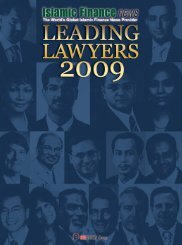Islamic Investor: Islamic Investor: - Islamic Finance News
Islamic Investor: Islamic Investor: - Islamic Finance News
Islamic Investor: Islamic Investor: - Islamic Finance News
You also want an ePaper? Increase the reach of your titles
YUMPU automatically turns print PDFs into web optimized ePapers that Google loves.
COVER STORY<br />
futures market to establish the market price? A price is<br />
determined between two parties, a seller and a buyer, but then<br />
how could you derive a competitive price and trade it? This<br />
is the key issue facing the development of <strong>Islamic</strong> commodity<br />
investments. And this is why we recently launched the DJIM<br />
Global Commodity Equity Index, to allow investors to diversify<br />
their portfolio with commodities, while respecting the Shariah<br />
principles,” he added.<br />
If you look at how<br />
commodities are priced,<br />
you will see that this poses a<br />
real problem for <strong>Islamic</strong><br />
investors<br />
Current Market Conditions<br />
Unfortunately, current investor sentiment does not bode well for<br />
either commodities or equities; with <strong>Islamic</strong> investors preferring<br />
to keep their investments in cash and other short-term and<br />
liquid products. However, most industry experts are banking on<br />
equities to make a stronger comeback than commodities once<br />
the markets regain their confi dence.<br />
Bryce Fegley, the president and chief investment offi cer<br />
at Saturna Capital in Malaysia, explains: “Many investors,<br />
conventional or <strong>Islamic</strong>, have become interested in<br />
commodities exposure in the last decade. Commodities prices<br />
followed a long-term trend of declining prices for 100 years<br />
until the beginning of this century, as more effi cient exploration<br />
and extraction methods offset growing demand and decreasing<br />
supply. Now that appears to have changed, and effi ciency<br />
gains by producers have not kept up with high demand and<br />
supply constraints.<br />
“As long as this continues, commodities prices may continue to<br />
rise, but probably with a lot of volatility. There are some risks<br />
to investing in commodities which include the fact that while<br />
high prices encourage the search for alternatives and greater<br />
effi ciency; in the aggregate high commodities prices can lead to<br />
destruction of demand and recessionary conditions that result<br />
in extreme price volatility like we witnessed in 2008 and 2009.”<br />
He added: “We prefer equities as long-term investments as<br />
they ultimately represent ownership in human creativeness and<br />
ingenuity. If people and the companies they run become more<br />
effi cient, shareholders should see higher returns at the expense<br />
of commodity hoarders. A high allocation to commodities is sort<br />
of like a wager that humans will fail to solve the big problems<br />
and standards of living will decline due to rising resource<br />
prices.”<br />
At present, investment options are still limited for <strong>Islamic</strong><br />
investors, with the main asset classes comprising equities, real<br />
estate, Sukuk, short-term instruments (Murabahah), precious<br />
metals and cash. “The biggest gap in the <strong>Islamic</strong> market is on<br />
the fi xed income side. While the development of Sukuk has<br />
offered new investment opportunities, as we saw with the<br />
increasing interest in the DJ Citigroup Sukuk Index, the market<br />
remains small and thinly traded. Beyond Sukuk, there is very<br />
little in terms of fixed income investments,” Al Rifai revealed.<br />
However, he too is bullish on the prospects equity trading has<br />
to offer: “Once global markets stabilize, we think investors<br />
will return to the equity market, since it offers great long-term<br />
investment potential. Equity markets in the Middle East will<br />
be particularly attractive to <strong>Islamic</strong> investors since there are<br />
growing investment opportunities in the region and they are<br />
more comfortable investing closer to home.<br />
As for the commodity side, if a Shariah compliant trading<br />
mechanism can be developed to trade commodities effi ciently,<br />
we think you will see a lot of interest from <strong>Islamic</strong> investors.”<br />
The need to educate <strong>Islamic</strong> investors on the investment<br />
options available to them is perhaps the most pressing matter<br />
at the moment. Empowering investors and allowing them to<br />
make clear and educated investment decisions; as opposed to<br />
jumping on the equities or commodities bandwagon depending<br />
on the current general consensus, will help in properly growing<br />
the secondary markets and perpetuating a strong investment<br />
culture - no matter what the current trend may be.<br />
<br />
<br />
<br />
6 September 2011

















